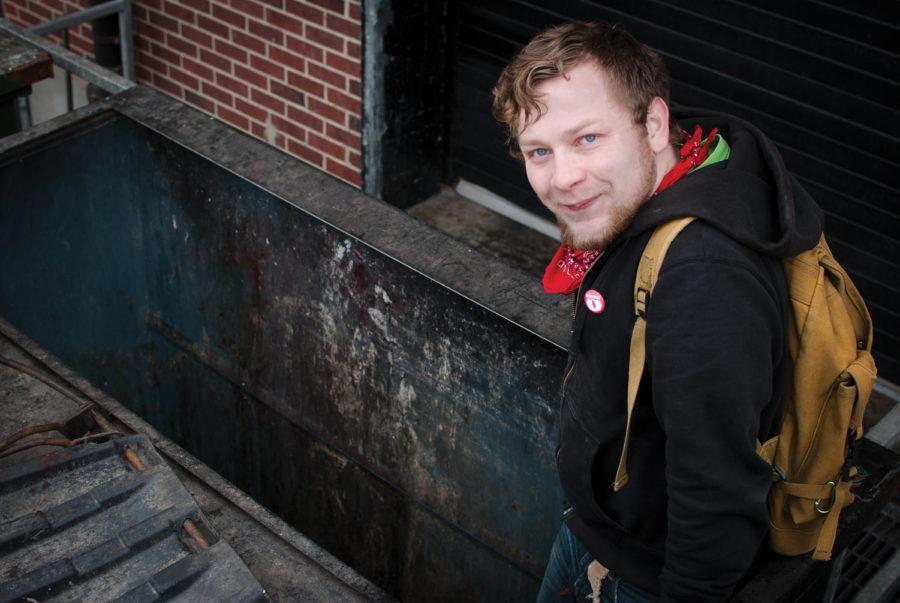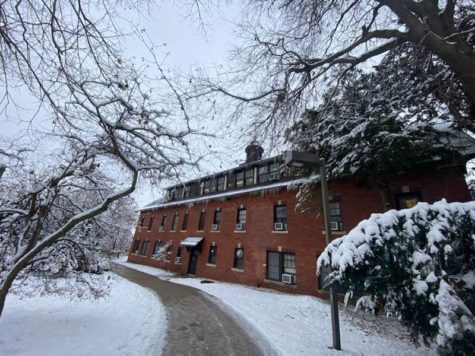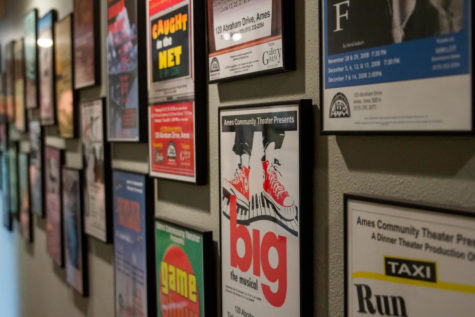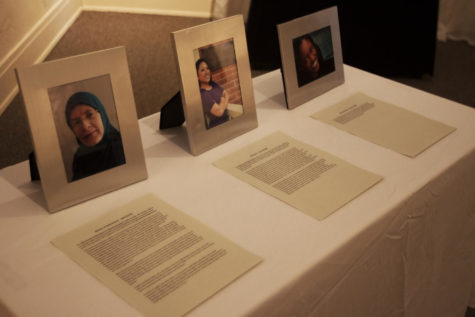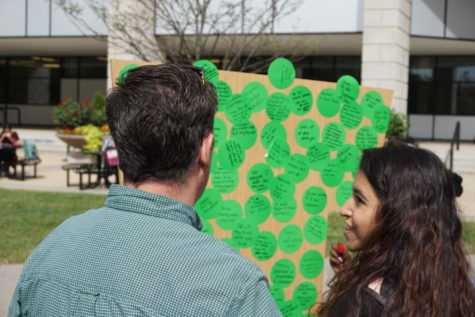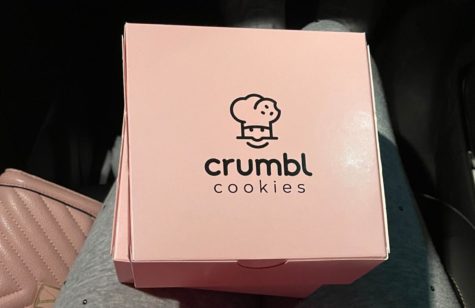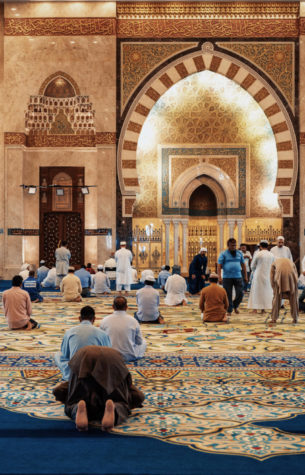ISU student explores, lives homeless lifestyle
Photo: David Derong/Iowa State Daily
Joseph David Soukup, senior in philosophy, often spends time salvaging useful things from dumpsters. Through a previous bad experience, Soukup does not recommend diving into a dumpster outside of a Chinese restaurant.
April 20, 2011
I’m looking at his grandmother’s farm, which consists of a silo and a barn. I’m looking at the Rocky Mountains. I’m looking at a path that leads to the mountains. I’m looking at Joseph Soukup’s tattoo, which represents more than I will be able understand.
In honor of Earth Day, I decided to sit down and have coffee with Soukup, a fellow ISU student originally from Boone and a senior in liberal studies, who decided to leave Ames and replace the farm life he had known his whole life for a life of anarchy and corybantic homelessness.
He’s hopped trains to go panning for gold. He has lived in a squat in Colorado Springs and admitted himself to a mental institution in Des Moines after he got arrested in Nebraska.
Soukup was raised on a farm in Boone, which his father still farms. He graduated from Gilbert High School in 2005, and went right to Iowa State. While at Iowa State, Soukup owned his own business called College Pro Painters.
He said he was the typical business owner: He wanted materialistic things, had the income and the lifestyle to prove it, but also the greed that comes along with success.
“I felt guilty with how I treated people,” Soukup said.
He began to realize that maybe there was more to life than the box he had been living in.
“I’ve always been an outsider,” Soukup said.
He left the life he knew Dec. 27, 2009. There were multiple reasons for his absence, the most important one being spiritual. His journey started at his cousin’s house in Colorado Springs, and then mysteriously he was booted to the curb.
With limited resources, he ended up in a squat — which is an abandoned house — with a bunch of punk anarchists. The squat had about 20 different kids of different ages. There were parties every night, but usually people only stayed for about a week at a time. For Soukup it was no different.
“I was the rich intellectual. I hadn’t had enough experience on the road for people to really respect me,” Soukup said.
After his stint in Colorado Springs, Soukup headed to Florida with a friend’s mother. He ended up in a temporary intentional community referred to as a Rainbow Gathering [updated from: homeless camp called Rainbow Gathering].
While speaking, Soukup detailed the little things of his trip, such as he fell in love with a girl named Rachel that had a purple hat, or he drank a cup of vodka with a man that looked like a pirate.
This Rainbow Gathering was one of many such communities around the world. The groups set up camp in state parks, which are state property, so they’re free game for anyone. The sizes of the groups vary, but this particular Rainbow Gathering was about 1,500 people. [Some information in this paragraph has been updated.]
Like in any mass of people, there were cliques. Soukup spoke of the “front gaters,” which were the hardcore of the hardcore. This group stayed at the front of the park to keep the police out. Typically there wasn’t any alcohol allowed in the camp, because it caused fights, but the front gaters always had alcohol. They weren’t the type you wanted to mix with.
“I went in with no expectations. I always expected to be stabbed with my rusty knife,” Soukup said.
Soukup only stayed in the Rainbow Gathering for two months, but some people stayed in the gathering for up to 40 years.
“Some people literally came with nothing; only the shirt on their back and a pair of shorts,” he said. “I started off my trip with a backpack, basic food, one pair of pants, two to three shirts and a couple of underwear and socks. By the end I came back with a lot less. I learned quality is better than quantity.”
The only stipulation was that every month the gathering relocated to another state park because they could only stay in a park for one month. There was every type of person, from hippies to runaway teens to punk anarchists. No matter who you were or what you had, the Rainbow Gathering would always support you, Soukup said.
“There were lots of different spiritual leaders. I loved it,” Soukup said.
In between stays, there were brief stints in Michigan with a favorite mentor of his, or small trips back to Iowa. But none were longer than two weeks. And after a stay in Michigan, Soukup decided to go back to the squat in Colorado. Once back, he got the respect he felt he deserved.
“When I first hit the road, people would just assume that I was stupid; however, the only people that ever helped were illegal immigrants and poor people,” he said.
After a few weeks in Colorado, he decided to come back to Ames for a small bout to gather funds for his next escapade. While in Ames, he stayed at the homeless shelter on Duff Avenue for about two weeks.
However, he didn’t want to stay in homeless shelters his entire trip.
“Homeless shelters are so depressing, and really boring,” Soukup said.
From there Soukup decided to hop a train in Boone to go panning for gold in Alaska. He met up with a blind man who had been hopping trains for years. However, his excitement was cut short when he only made it to Nebraska and got arrested. It’s a felony to hop trains, because the trains are government property. He had a machete on him.
Luckily, the judge seemed to take a liking to him.
“The judge really appreciated that I got dressed up, and showed up for court. A lot of homeless people just leave as soon as they get out,” Soukup said.
Soukup got off with a $140 fine. He still wants to travel via train to Alaska to pan for gold some day.
Following his arrest, he decided it was time to call it good and head back to Iowa. It wasn’t an easy adjustment. Most of his family had practically disowned him. His relationship with his parents was strained, and the only family he relates with are his grandparents, who he eats with every Friday.
“I wanted to prove something to my family,” Soukup said.
“When I first started on the road, I felt that I had to share everything,” Soukup said. “After Nebraska, I came back to Ames pretty much alone.”
All in all, Soukup wants people to know that he’s still alive. He had his doubts while on the road.
“I was either going to find God or I was going to die. I didn’t think that I was going to come back,” he said.
When asked how he likes living in Ames now, he said society is plastic comfortability. It’s like living from box to box; everything is in boxes.
Soukup hopes that his next adventure will be abroad with his band, Peace, Love & Stuff.

